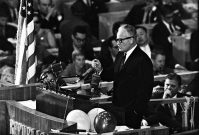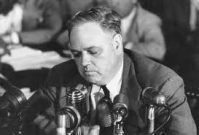Ronald Reagan, Whittaker Chambers, and the Dialogue of Liberty
 The Watergate controversy and the collapse of the Nixon presidency led me to closely follow the 1976 presidential election, the first national election that I took seriously. The result of that research was a reasoned vote for Gerald Ford.
The Watergate controversy and the collapse of the Nixon presidency led me to closely follow the 1976 presidential election, the first national election that I took seriously. The result of that research was a reasoned vote for Gerald Ford.
Ford, though, had not been my first choice for the Republican nomination. As it did for many others, the Reagan challenge had inspired me, and I was disappointed when Reagan fell short at the convention. By 1980, I was solidly in the Reagan camp, rejoicing in his stunning electoral victory over an incumbent president. I still remember the reaction of one of my professors the morning after the election. Clearly disturbed, he announced to the class that he could scarcely bring himself to realize that “that cowboy has been elected president.” His perspective was not unique; it was dominant on that campus—and most others.
During the Reagan presidency, I discovered that Reagan had read Whittaker Chambers’s Witness, a book many considered seminal to the conservative movement. Reagan credited the book with providing his understanding of the philosophy and workings of the communist mind, and I decided it was time to evaluate it myself.
I did not expect what I found. I expected a treatise on communism and how wrong it was. What I received was far more. Chambers had not written a political tract; instead, he wrote painfully of the weaknesses in his own life while detailing the tragic consequences of a philosophy that he believed dethroned God and the sources of the moral contents of life. It was not just a story. It was not simply an autobiography. It was a personal spiritual reflection and confession. One reading was not enough, even though it was 799 pages. I had to go through it again to see what I might have missed the first time. I believed the work to be so significant that later I developed an entire college course around the book and its author, “The Witness of Whittaker Chambers.”
My interest in Reagan also continued to grow. I have another course I teach entitled “Ronald Reagan and Modern American Conservatism,” which incorporates the development of modern conservatism along with the events of the Reagan years. One of the more fascinating debates about conservatism centers on the contrast between Chambers’s pessimism about the future of Western Civilization and Reagan’s sunny optimism that freedom would ultimately triumph. Conservatives who admire both men, it seems to me, have found Reagan’s perspective more to their liking. Who wouldn’t prefer optimism?
Reagan himself, at National Review’s Thirtieth Anniversary dinner in 1985, famously noted,
When he left Communism for the Western side, one editor of the magazine said he understood his defection meant he was joining the losers. I can think of no better way to pay tribute to his memory—and frankly nothing he would have liked better—than to say: We can affirm here tonight that Whittaker Chambers was wrong. That civilization will triumph. That freedom is the winning side.
Reagan’s optimism shines forth—this was four years prior to the tearing down of the Berlin Wall and six years before the USSR ceased to exist. Yet he was supremely confident that the victory belonged to the West.
Bill Buckley, though, in his closing remarks that evening, sought to balance the president’s statement, offering a remembrance of a conversation he had with Chambers when he was trying to convince him to be one of the editors of National Review:
A year before National Review was founded, I spent an evening with Whittaker Chambers, and he asked me, half provocatively, half seriously, what exactly it was that my prospective journal would seek to save. I trotted out a few platitudes of the sort one might expect from a twenty-eight-year-old fogy, about the virtues of a free society. He wrestled with me by obtruding the dark historicism for which he had become renowned. Don’t you see? he said. The West is doomed, so that any effort to save it is correspondingly doomed to failure. I drop this ink stain on the bridal whiteness of this fleeted evening only to acknowledge soberly that we are still a long way from establishing for sure that Whittaker Chambers was wrong. But that night, challenged by his pessimism, I said to him that if it were so that providence had rung up our license on liberty, stamping it as expired, the Republic deserved a journal that would argue the historical and moral case that we ought to have survived: that, weighing the alternative, the culture of liberty deserves to survive. So that even if the worst were to happen, the journal in which I hoped he would collaborate might serve, so to speak, as the diaries of Anne Frank had served, as absolute, dispositive proof that she should have survived, in place of her tormentors—who ultimately perished. In due course that argument prevailed, and Chambers joined the staff.
In this passage, Buckley is more cautious than Reagan: he would not go as far as the president did in asserting that Chambers had been proven wrong. The final triumph over communism was not yet resolved.
 Whittaker Chambers had no doubts with regard to the evil that resides within man. His affinity for writers and thinkers such as Fyodor Dostoevsky and Reinhold Niebuhr, and his own experiences in his dysfunctional upbringing, his life within the communist underground, his writings as a senior editor at Time, and throughout the duress of the Alger Hiss case, leave little room for debate on that point of doctrine. Reagan, meanwhile, seemed to hold contradictory views with respect to the nature of man. As he himself noted, he tended to see the good in people. At the same time, he recognized evil in individuals and empires alike; most of his life after Hollywood was spent trying to expose and overthrow what he believed was an evil system. Chambers helped balance Reagan’s natural tendency to see primarily the good. Witness provided Reagan with a sobering reality. He said that Witness helped him learn the bitter truth “of that great socialist revolution which in the name of liberalism has been inching its icecap over the nation for two decades.”
Whittaker Chambers had no doubts with regard to the evil that resides within man. His affinity for writers and thinkers such as Fyodor Dostoevsky and Reinhold Niebuhr, and his own experiences in his dysfunctional upbringing, his life within the communist underground, his writings as a senior editor at Time, and throughout the duress of the Alger Hiss case, leave little room for debate on that point of doctrine. Reagan, meanwhile, seemed to hold contradictory views with respect to the nature of man. As he himself noted, he tended to see the good in people. At the same time, he recognized evil in individuals and empires alike; most of his life after Hollywood was spent trying to expose and overthrow what he believed was an evil system. Chambers helped balance Reagan’s natural tendency to see primarily the good. Witness provided Reagan with a sobering reality. He said that Witness helped him learn the bitter truth “of that great socialist revolution which in the name of liberalism has been inching its icecap over the nation for two decades.”
Reagan’s optimism was based on his Christian understanding of redemption. He had experienced his own personal redemption, he spoke of Chambers’s redemption from his former life as a communist, and he fervently asserted that God was poised to redeem the world from totalitarian communism. Chambers, from the same basic Christian anthropology, could not express that degree of optimism. He believed, as Reagan did, that God redeems individuals, but had a much more pessimistic view of that redemption rippling throughout society. Chambers’s perspective can be likened to the Old Testament prophet Jeremiah, who foretold disaster for ancient Judah because of its apostasy while simultaneously calling the people to repentance. Reagan and Chambers held to the same faith, the same basics truths about life, yet they differed in their predictions of the future of freedom.
Reagan correctly perceived the looming demise of the Soviet Union. In the 1980s, freedom appeared to be on the march. When the USSR did eventually fall, some predicted that American-style freedoms would naturally follow as people shed the shackles of their communist rulers. The reality, though, hasn’t been so rosy. Today, Russian nationalism, in the person of Vladimir Putin, dominates that nation. Putin, and Russia as a whole, don’t embrace Western liberties. Then there is the emergence of radical Islam, which raises a new threat to Western Civilization. Many fear we don’t have the foundations anymore to resist this threat. Part of that is due to the loss of our religious culture in the West generally, and a religious/secular polarization within America specifically.
One of Chambers’s closest friends, Ralph de Toledano, noted that when the “evil empire” collapsed, people asked him: “Would Whittaker Chambers still believe that he had left the winning side for the losing side?” He replied that Chambers, long before the collapse, had already seen “that the struggle was no longer between Communism and Western civilization, but one in which Western civilization was destroying itself by betraying its heritage.” In essence, “Communism had triumphed, not in its Marxist tenet but in its concept of man—a concept which the West has accepted.” It goes back to Chambers’s insistence that there are two faiths and the West must make a decision: God or man? As he wrote in Witness:
God alone is the inciter and guarantor of freedom. He is the only guarantor. External freedom is only an aspect of interior freedom. Political freedom, as the Western world has known it, is only a political reading of the Bible. Religion and freedom are indivisible. Without freedom the soul dies. Without the soul there is no justification for freedom. …
… There has never been a society or a nation without God. But history is cluttered with the wreckage of nations that became indifferent to God, and died.
What is the conclusion then? Which of these conservative icons was more accurate in predicting the future of freedom? It is not a matter of either one being completely right or completely wrong. Ronald Reagan saw a reality in his day: communism robbed the people of their spirit; it denied the freedom for which a growing number was clamoring; it was teetering on the edge of financial ruin and something had to change. He took action, both in word and deed and in tandem with other like-minded leaders, that helped push the doddering old philosophy and its seed over the brink. He rightly rejoiced in the fall of the Soviet Union. Whittaker Chambers might have concluded the same as Reagan if he could have witnessed the march of events in the 1980s. Yet he would not have allowed the fall of communism in Russia to make him euphoric.


